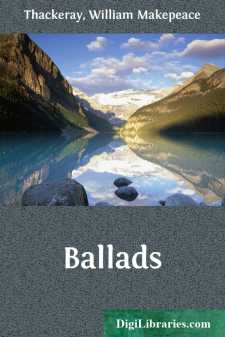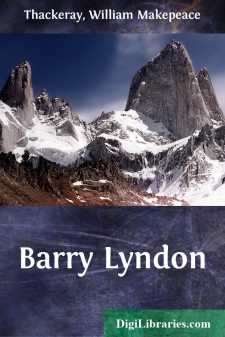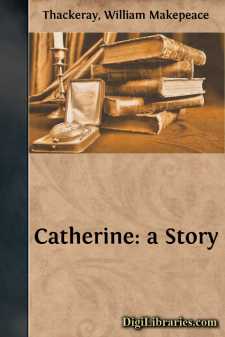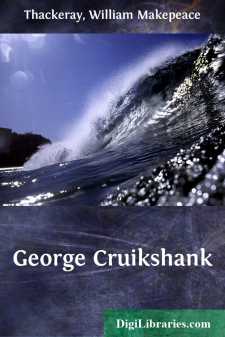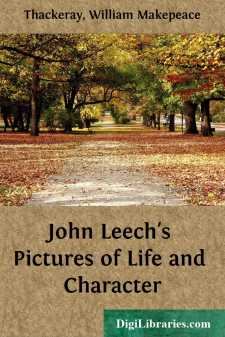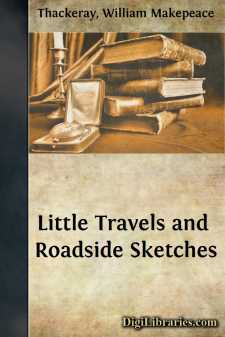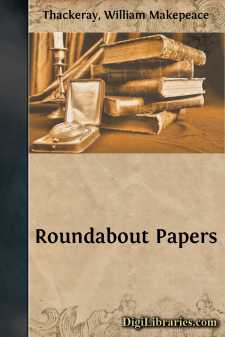Categories
- Antiques & Collectibles 13
- Architecture 36
- Art 48
- Bibles 22
- Biography & Autobiography 813
- Body, Mind & Spirit 142
- Business & Economics 28
- Children's Books 17
- Children's Fiction 14
- Computers 4
- Cooking 94
- Crafts & Hobbies 4
- Drama 346
- Education 46
- Family & Relationships 57
- Fiction 11829
- Games 19
- Gardening 17
- Health & Fitness 34
- History 1377
- House & Home 1
- Humor 147
- Juvenile Fiction 1873
- Juvenile Nonfiction 202
- Language Arts & Disciplines 88
- Law 16
- Literary Collections 686
- Literary Criticism 179
- Mathematics 13
- Medical 41
- Music 40
- Nature 179
- Non-Classifiable 1768
- Performing Arts 7
- Periodicals 1453
- Philosophy 64
- Photography 2
- Poetry 896
- Political Science 203
- Psychology 42
- Reference 154
- Religion 513
- Science 126
- Self-Help 84
- Social Science 81
- Sports & Recreation 34
- Study Aids 3
- Technology & Engineering 59
- Transportation 23
- Travel 463
- True Crime 29
William Makepeace Thackeray
William Makepeace Thackeray was an English novelist and satirist, best known for his novel "Vanity Fair," which offers a scathing critique of early 19th-century British society. Born on July 18, 1811, in Calcutta, India, Thackeray's works often explored themes of social climbing and hypocrisy. His wit and keen observations made him one of the leading literary figures of the Victorian era.
Author's Books:
Sort by:
Mr. and Mrs. Fitzroy Timmins live in Lilliput Street, that neat little street which runs at right angles with the Park and Brobdingnag Gardens. It is a very genteel neighborhood, and I need not say they are of a good family. Especially Mrs. Timmins, as her mamma is always telling Mr. T. They are Suffolk people, and distantly related to the Right honorable the Earl of Bungay. Besides his house in...
more...
THE CHRONICLE OF THE DRUM. PART I. At Paris, hard by the Maine barriers,Whoever will choose to repair,Midst a dozen of wooden-legged warriorsMay haply fall in with old Pierre.On the sunshiny bench of a tavernHe sits and he prates of old wars,And moistens his pipe of tobaccoWith a drink that is named after Mars. The beer makes his tongue run the quicker,And as long as his tap never fails,Thus over his...
more...
A BIBLIOGRAPHICAL NOTE Barry Lyndon—far from the best known, but by some critics acclaimed as the finest, of Thackeray's works—appeared originally as a serial a few years before VANITY FAIR was written; yet it was not published in book form, and then not by itself, until after the publication of VANITY FAIR, PENDENNIS, ESMOND and THE NEWCOMES had placed its author in the forefront of the...
more...
In the Morning of Life the Truthful wooed the Beautiful, and their offspring was Love. Like his Divine parents, He is eternal. He has his Mother's ravishing smile; his Father's steadfast eyes. He rises every day, fresh and glorious as the untired Sun-God. He is Eros, the ever young. Dark, dark were this world of ours had either Divinity left it—dark without the day-beams of the Latonian...
more...
CHAPTER I. INTRODUCING TO THE READER THE CHIEF PERSONAGE OF THIS NARRATIVE. At that famous period of history, when the seventeenth century (after a deal of quarrelling, king-killing, reforming, republicanising, restoring, re-restoring, play-writing, sermon-writing, Oliver-Cromwellising, Stuartising, and Orangising, to be sure) had sunk into its grave, giving place to the lusty eighteenth; when Mr....
more...
Accusations of ingratitude, and just accusations no doubt, are made against every inhabitant of this wicked world, and the fact is, that a man who is ceaselessly engaged in its trouble and turmoil, borne hither and thither upon the fierce waves of the crowd, bustling, shifting, struggling to keep himself somewhat above water—fighting for reputation, or more likely for bread, and ceaselessly occupied...
more...
We, who can recall the consulship of Plancus, and quite respectable, old-fogyfied times, remember amongst other amusements which we had as children the pictures at which we were permitted to look. There was Boydell's Shakspeare, black and ghastly gallery of murky Opies, glum Northcotes, straddling Fuselis! there were Lear, Oberon, Hamlet, with starting muscles, rolling eyeballs, and long pointing...
more...
I.—FROM RICHMOND IN SURREY TO BRUSSELS IN BELGIUM . . . I quitted the "Rose Cottage Hotel" at Richmond, one of the comfortablest, quietest, cheapest, neatest little inns in England, and a thousand times preferable, in my opinion, to the "Star and Garter," whither, if you go alone, a sneering waiter, with his hair curled, frightens you off the premises; and where, if you are bold...
more...
In a certain quiet and sequestered nook of the retired village of London—perhaps in the neighbourhood of Berkeley Square, or at any rate somewhere near Burlington Gardens—there was once a house of entertainment called the "Bootjack Hotel." Mr. Crump, the landlord, had, in the outset of life, performed the duties of Boots in some inn even more frequented than his own, and, far from being...
more...
ON A LAZY IDLE BOY. I had occasion to pass a week in the autumn in the little old town of Coire or Chur, in the Grisons, where lies buried that very ancient British king, saint, and martyr, Lucius,* who founded the Church of St. Peter, on Cornhill. Few people note the church now-a-days, and fewer ever heard of the saint. In the cathedral at Chur, his statue appears surrounded by other sainted persons...
more...



